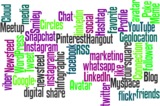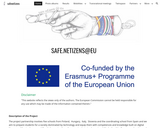
This lesson will focus on digital citizenship.
- Subject:
- Educational Technology
- Material Type:
- Lesson Plan
- Author:
- Kim Foley-Sharp
- Date Added:
- 11/14/2017

This lesson will focus on digital citizenship.

The project partnership involves five schools from Finland, Hungary, Italy, Slovenia and the coordinating school from Spain and we aim to prepare students for a society dominated by technology and equip them with competences and knowledge built on digital literacy and foreign language skills which can give them the opportunity to implement mobility both within European education and labour market. We want this project to teach our students to become European citizens actively involved in a digitalized society and we are convinced that by providing our students with better digital skills, they will have better job opportunities in the European market as well as a sense of responsibility in terms of technology use.
We also aim to promote education for volunteering as a component of European active behaviour since students will learn how to better work in teams, develop leadership and problem-solving skills, and do volunteer work. This is not only essential for schoolwork but also for further involvement in the community. Therefore, throughout the project there will be practical volunteering activities performed by students, parents and teachers of all partner schools at local and international level.
We also have a concern for disadvantaged students and underachievement, so as teachers we have a need to improve our teaching skills to develop innovative approaches and practices that contribute to the implementation of inclusive methodologies and also to a greater achievement of our students’ basic skills. We want to enhance our digital skills in order to motivate our students and address diversity with the use of innovative ICT tools.
To achieve our aims all schools have agreed on the following objectives:
- Develop and enhance digital literacy, skills and inclusion.
- Make students aware of the need to make a safe use of new technologies and promote a responsible and respectful digital behaviour.
- Increase the European civic competences and behaviour through volunteering.
- Cooperate and exchange good practices and innovative methods to motivate and engage students with the help of ICT tools
- Enhance language skills in first and second languages as well as intercultural competences to improve the student’s command in ICT and skills for work.
- Promote digital training for students and teachers in the use of open educational resources (OER).
The activities have been planned in a way that the project covers the nine elements of Digital Citizenship, namely Digital Access , Digital Commerce, Digital Communication, Digital Literacy, Digital Etiquette, Digital Law, Digital Rights and Responsibilities, Digital Health and Wellness and Digital Security.
Our project includes activities involving participating and working together on tasks at national level and others with students from the five schools of the partnership collaborating and working jointly during mobilities. They will mainly be implemented in the form of non-formal learning, using tools that are the most suitable for assessing the acquired knowledge and skills.
As regards the beneficiaries of the project, the target groups will go through a transparent selection process to take part in the mobilities, but project activities will also involve teachers, students’ families, volunteer students, outside partners, foundations, local authorities and communities for a better impact and dissemination.
We expect tangible and intangible results. Students will have an online portfolio where they collect all the materials created – at the end of the project, based on their work and a test, a digital driver’s licence will be awarded – it will later be used for other students as well and incorporated in the curriculum. Students will take part in debate sessions on topics related to project work during student exchanges.
· Teachers will learn new ways to motivate students with mobile and ICT tools. They will create a manual of their teaching practice on digital citizenship and tools for different educational purposes in different subjects.
The project will have an impact on the students’ future development as the skills acquired will contribute to the improvement of their academic achievements and entering the world of work.
The European dimension will be reinforced as a result of the sustainable cooperation of the five partner schools. Mobilities, methodological changes, and the internationalization of the institutions will mark a turning point at school level after the European experience and will serve as the basis for future cooperation. The project will also help create long-lasting synergies with institutions and collaborating partners in the activities at local, regional and international level. We will seek opportunities for carrying on joint activities based on our project findings and will take part in a new eTwinning or another international project trying to involve as many new members as possible